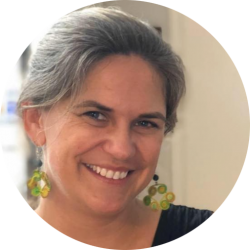From the minute she learned about the role of a genetic counsellor, Emma Celis Rivas knew it was the career for her.
In 2009, Emma Celis Rivas had a conversation that changed everything. “I was talking with a friend whose daughter was affected by a genetic condition. She told me about the invaluable help she and her family had received from a genetic counsellor and I was immediately intrigued,” Emma explains.

“I majored in Genetics and Pharmacology during my Bachelor of Science and graduated with a deep love of genetics but also convinced that I wanted to work with people and not in a lab. A career as a genetic counsellor seemed to fit my interests perfectly.”
She did some research and became even more convinced it was for her, but despite reviewing course offerings regularly, her study options were limited. “Unfortunately, there were no genetic counselling courses in Perth, and between my partner’s work and family commitments, moving interstate just wasn’t an option.”
She put the idea on the back burner, where it simmered until a fateful day in 2019 when some Googling produced an exciting result. “UTS was promoting its Master of Genetic Counselling, a mostly online course. It was suddenly possible to continue living in Perth while gaining the qualification.”
Now, one year in, and balancing parenting two young children with full-time studying, Emma says it has not been without its challenges, but she’s getting through it due to excellent support from her community.
My placement has been so rewarding. It’s such a privilege talking with people about their journey and hearing their stories.
Emma Celis Rivas
Student, Master of Genetic Counselling
“I’m certainly learning the truism of, ‘It takes a village to raise a child,’ or in my case, ‘It takes a village to get through a Masters!’” she laughs.
In her cohort of 24 students from all over Australia and New Zealand, Emma says the different time zones have occasionally made things tricky, in terms of group assignments and early starts, but the overall flexibility of the degree has made everything possible.
“The academic team are understanding and supportive of a student’s individual circumstances and the content of the course itself is ticking all my boxes,” she continues.
“It’s so engaging. The knowledge and experience the teaching staff, guest speakers, doctors and patients offer us is broad and impressive; the assignments are well thought out, and it’s satisfying my love of medical science on the one hand and my love of helping people on the other.”
Currently, on a placement at a hospital-based genetic service, Emma is working on the familial cancer program which involves seeing patients face-to-face and via Telehealth, talking about familial cancers (cancers that impact multiple members of a family), genetic testing, and the risks for them and their future children.
“My placement has been so rewarding. It’s such a privilege of talking with people about their journey and hearing their stories. It’s also like putting the pieces of a jigsaw puzzle together and seeing the bigger picture of how what we’re learning, in theory, fits into practice.”
In her ideal future, Emma would like to work as a genetic counsellor within the genetic services in Western Australia. She says a key piece of advice she’d give students considering the course is to get experience talking with people about potentially uncomfortable things.
“While I was waiting for the opportunity to study genetic counselling I trained as a volunteer breastfeeding counsellor through the Australian Breastfeeding Association. I knew that type of experience would serve me well for my future, and it certainly has,” she continues.
Learn more about Genetic Counselling at the Graduate School of Health

